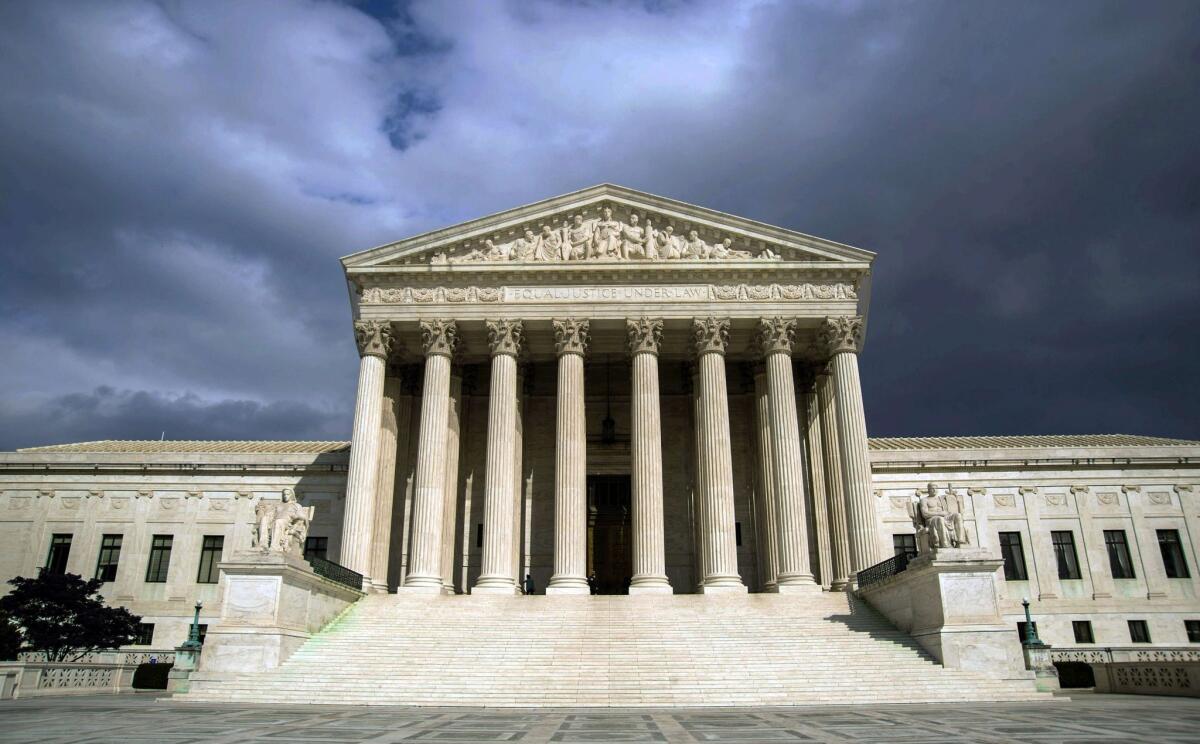Supreme Court seems ready to reopen racial bias claims in Texas and Illinois

- Share via
Reporting from Washington — The Supreme Court justices on Wednesday appeared ready to reopen the claims of two black men in separate cases involving alleged racial bias, one from a Texas convict on death row and another from a Joliet, Ill., man who said he was jailed for seven weeks based on evidence fabricated by a police officer.
In both cases, the justices questioned why lower courts had tossed out their claims. But they also hinted they are not likely to rule broadly on race discrimination or police misconduct.
Instead, they spoke of setting aside the legal barriers that stood in the way of people who say their constitutional rights were violated.
The Texas case began nearly 20 years ago when Duane Buck was sentenced to die for a double murder after jurors were told that blacks are, statistically speaking, more dangerous than whites and more likely to commit future crimes of violence.
This was “an explicit appeal to racial bias. It is an extraordinary case,” Christina Swarns, an attorney for the NAACP Legal Defense Fund, told the justices.
But in appealing his sentence, Buck ran into a series of procedural barriers. First, his claims were dismissed because his own court-appointed trial lawyer brought in the expert who offered the inflammatory testimony about data showing blacks were more dangerous. Then later, a different court-appointed state lawyer did not raise this issue of racial bias when he lodged his first appeal.
Ever since, judges have refused to reopen Buck’s case because he had failed to raise the claim in time. John Cornyn, then the Texas attorney general, announced in 2000 that his office would not stand in the way of appeals like Buck’s, which arose from testimony reflecting racial bias. But after he left office, the state switched position and opposed a new hearing for Buck.
Five years ago, the divided Supreme Court refused to hear Buck’s case.
But from the opening minutes on Wednesday, the justices debated only whether to rule narrowly or broadly for Buck. A narrow ruling would tell the U.S. appeals court in New Orleans to take another hard look at Buck’s appeals. A broader ruling would go further and tell the lower court that Buck deserves a new sentencing hearing because of the racially biased testimony.
This was “wildly prejudicial,” said Justice Elena Kagan, yet his claim “has never been heard by any court.”
In the Joliet case, the justices spent most of the hour debating how to describe Elijah Manuel’s claim. Was it a claim of false arrest, a violation of the 4th Amendment’s ban on unreasonable searches? Or was it a violation of his right to due process of law, if a magistrate sent him to jail based on evidence fabricated by a police officer?
Should it be legal to have a congressional district only one party can win? »
According to Manuel’s complaint, he was a passenger in his brother’s car when they were pulled over for failing to signal a turn. He said an officer pulled him from the car, threw him to the ground, kicked him, handcuffed him and subjected him to racial slurs. He said he was arrested and taken to jail for having pills in his pocket that the officer claimed were Ecstasy.
Manuel denied they were illegal drugs, but the officer in his arrest report said he “knew the pills to be Ecstasy.”
At the station, a technician also suspected the pills were not Ecstasy, but the officer told the magistrate they were illegal drugs, and Manuel was sent to jail and charged with a felony. An Illinois police lab confirmed the pills were not illegal drugs, but despite that report, Manuel was held for seven weeks before he was released.
He filed a lawsuit against the city and the two police officers involved in the arrest, alleging he was the victim of an unreasonable search and seizure and a malicious prosecution. But a federal judge in Chicago and the 7th Circuit Court threw out his claims.
Unlike other courts, the 7th Circuit said claims based on the 4th Amendment and unreasonable seizures expire as soon as the arrested person appears before a magistrate. As a result, the court said Manuel could not press a 4th Amendment claim over the seven weeks he spent in jail.
Stanley Eisenhammer, an attorney from Arlington Heights who represents Manuel, said the justices should overrule the 7th Circuit’s decision and send the case back to Chicago.
“Our claim here is detention without probable cause. And that detention went through 48 days after he was subject to legal process,” he told the court.
Court disputes over voting laws often divide justices along party lines »
Justice Sonia Sotomayor agreed he had a valid claim if the “legal process is corrupted” by “false information” supplied by the police.
Justice Ruth Bader Ginsburg said he had a claim for wrongful detention if it is true “the police lied all along” to keep him in jail.
At the early stage of such a lawsuit, the justices assume the facts of the complaint are true. They did not discuss the details of Manuel’s claim during Wednesday’s argument. The justices also agreed a police officer could not held liable for making an honest mistake during an arrest.
Justice Stephen Breyer said the case did not pose a difficult question. “I thought everyone agrees that if a police officer wrongly arrests you — maliciously arrests you — and puts you in jail, you have a claim for a false arrest.”
It will probably be several weeks before the justices issue decisions in the two cases: Buck vs. Davis and Manuel vs. City of Joliet.
On Twitter: DavidGSavage
More to Read
Sign up for Essential California
The most important California stories and recommendations in your inbox every morning.
You may occasionally receive promotional content from the Los Angeles Times.














